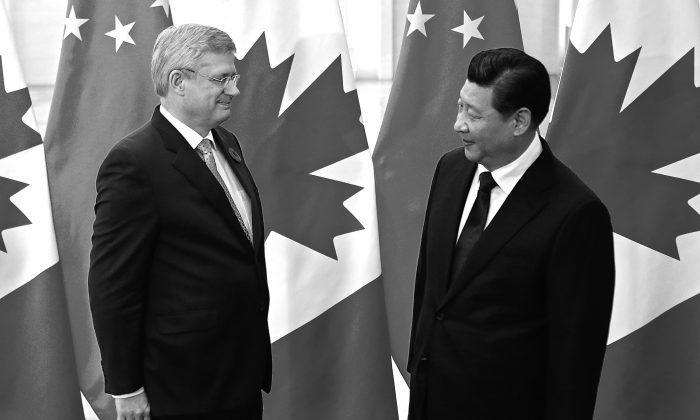OTTAWA—Prime Minister Stephen Harper did his duty to Canada’s business community last week, flying to China to glad-hand senior members of the Chinese Communist Party and presiding over the inking of deals.
But now that the belief trade would bring rights and rule of law to China has proven false, how to move forward? Canadian businesses face state-sanctioned IP theft, China is still jailing Christians, and the People’s Liberation Army was even bold to show off new military hardware designed for conflict with our closest ally, the United States, when world leaders were there for the recent APEC summit.
Is there anything Canada can do to steer China in a better direction, or must our dealings there keep benefiting a regime believed to kill prisoners of conscience in order to sell their organs?
Tacit Consent
Some experts, like Charles Burton, believe there is very little Canada can do because we don’t have much leverage over the Chinese regime.
“Canada is a relatively minor player and they are able to obtain what they want from us from other countries,” said Burton, a professor at Brock University widely held as one of Canada’s foremost China experts.
He’s not sure there is a way to approach China that would move the needle on human rights or the rule of law while balancing the needs of Canadian prosperity. But he also believes Canada can’t keep silent over widespread abuses and reports of forced organ harvesting.
“If we don’t speak publicly, it looks like we are giving tacit consent for regime behaviour that we don’t approve of,” he said.
That’s the risk Harper faces every time he’s in a staged photo-op with Chinese officials. Burton believes the government is aware it could be legitimizing the regime with state visits and the media coverage surrounding them.
“I think it’s something that we’re very hesitant to do, because Canadian values don’t support the kind of values that uphold that regime,” he said.
The challenge for Harper is that any move to speak publicly about human rights brings on a tirade of criticism from Canada' China business lobby.
Those companies have made sizeable investments to move manufacturing to China, or set up joint ventures with Chinese firms on promises of market access. They’re also counting on Chinese demand to offset dependence on the U.S. market for our natural resources. The last thing they want is a prime minister upsetting their hard-won gains in China.
Guanxi Gone Wrong
Punishment can be arbitrary in China, and the rules don’t apply evenly. Relationships are everything.
Ethan Gutmann used to be in the guanxi business in China. These days he is better known as the investigative journalist behind the newly released book “The Slaughter: Mass Killings, Organ Harvesting, and China’s Secret Solution to Its Dissident Problem.”
But a bit over 10 years ago he was in China, working the angles for the American business community.
Gutmann was a senior counsellor at APCO, the premier public affairs firm in Beijing. It’s basically a guanxi company, he said. Guanxi is the Chinese idea of building relationships you can use to get favours.
APCO would lobby officials, build relationships, and partake in the usual disguised forms of bribes which are important tools of influence—all in the name of guanxi.
“Guanxi is the most successful business strategy you can have in China,” said Gutmann. “That is the main method to move things around in China.”
The problem is, it only works for businesses. When applied as a general approach to foreign affairs, it translates into Canada kow-towing to China and never raising a fuss about espionage, copyright violations, or that the Chinese regime is torturing people for their beliefs.
Canadian companies don’t see any of that as their responsibility. They want their government to get them access and protection, and guanxi is how it’s done.
But even guanxi won’t get the regime to go against its own interests, said Gutmann. He learned that when APCO lobbied Beijing on IP rights and counterfeiting. The cadres he spoke to pledged dramatic reforms.
“They adopted U.S. language completely. … The problem was the actual rate of counterfeiting increased.”
“They are willing to give you soothing rhetoric and abuse you at the same.”
Absorbing the IP and technical know-how from foreign companies is critical for the regime’s long-term economic and military development. By promising reforms, it keeps foreign investors appeased, but the regime has never had much interest in curtailing a practice seen as critical to its own economic fortunes.
And even though rule of law would help foreign companies in China, it is seen as a far-off solution, and they have immediate investments they need to recoup, including sunk costs building up guanxi with the current Chinese leadership, said Gutmann.
“A democratic system, a free press, and genuine rule of law would be a beneficial climate. The problem is nobody in business knows how to get there from here.”
Legitimacy, the Big Stick
One of the few tools Canada has, given its rather generic exports and relatively small market, is its reputation. Gutmann calls it a powerful tool if used to embarrass the Chinese Communist Party.
While Burton thinks Canada has relatively little sway in China, Gutmann gives Canada a little more weight. He thinks conferring legitimacy or withholding it matters to the CCP.
The Chinese regime is “is very concerned about perception, particularly for domestic purposes, and they look to Canada as an ethical or moral weathervane of the world in a sense,” he says.
Unfortunately, he adds, Canada has given its blessing far too easily, and with few strings attached.
That said, Harper’s ploy to skip APEC stirred urgent requests for his attendance from the Chinese leadership for exactly that reason, argued Burton in a recent op-ed.
It may be that Harper was withholding his presence to secure the release of Kevin and Julia Garratt, the two evangelical Christians who ran a coffee shop near the North Korean border arrested on allegations of espionage in August.
Regardless of the opinions of the business community, Burton thinks raising human rights or other matters is unlikely to hurt trade, and export figures back him up.
Former Canadian Ambassador to China David Mulroney argued in a Globe and Mail op-ed in July that Canada needn’t be so timid about speaking up about the ongoing problems.
“Chinese officials are not afraid of frank talk. I was summoned for finger-wagging lectures whenever the Chinese government wanted to send a tough message to Ottawa. China’s ambassador to Canada typically gets the kid gloves treatment. He’s a tough and experienced professional. If we’re angry, he needs to feel our pain,” he wrote.
Mulroney was arguing that Canada should engage China, but with its eyes open and its self-interest firmly front and centre.
But thinking also about the how Chinese people are affected by our trade or how we confer legitimacy on the CCP isn’t beyond reason, suggests Gutmann.
“The first step is not to pretend you are balancing trade and human rights by following what business dictates,” he said.





